
Fatah, formally the Palestinian National Liberation Movement, is a Palestinian nationalist and social democratic political party. It is the largest faction of the confederated multi-party Palestine Liberation Organization (PLO) and the second-largest party in the Palestinian Legislative Council (PLC). Mahmoud Abbas, the President of the Palestinian Authority, is the chairman of Fatah.

The Gaza Strip, also known simply as Gaza, is a small territory located on the eastern coast of the Mediterranean Sea; it is the smaller of the two Palestinian territories, the other being the West Bank, that make up the State of Palestine. Inhabited by mostly Palestinian refugees and their descendants, Gaza is one of the most densely populated territories in the world. Gaza is bordered by Egypt on the southwest and Israel on the east and north. The territory has been under Israeli occupation since 1967.
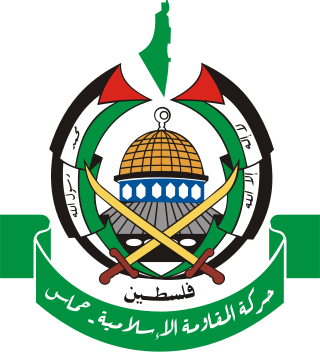
The Islamic Resistance Movement, abbreviated Hamas, is a Palestinian nationalist Sunni Islamist political organisation with a military wing called the Izz al-Din al-Qassam Brigades. It has governed the Israeli-occupied Gaza Strip since 2007.
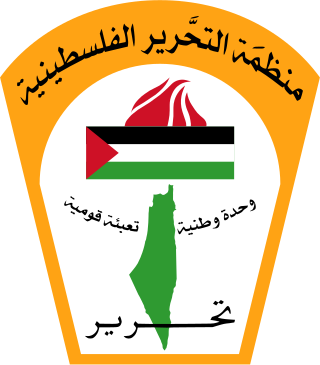
The Palestine Liberation Organization is a Palestinian nationalist coalition that is internationally recognized as the official representative of the Palestinian people in both the Palestinian territories and the diaspora. It is currently represented by the Palestinian Authority based in the West Bank city of Al-Bireh.
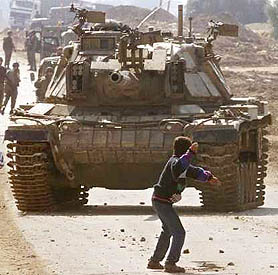
The Second Intifada, also known as the Al-Aqsa Intifada, was a major uprising by Palestinians against Israel and its occupation. The period of heightened violence in the Palestinian territories and Israel continued until the Sharm el-Sheikh Summit of 2005, which ended hostilities.
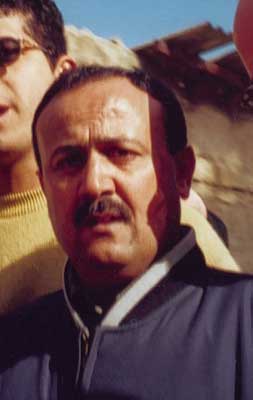
Marwan Barghouti is a Palestinian political leader convicted and imprisoned for his role in deadly attacks against Israel. He is regarded as a leader of the First and Second Intifadas. Barghouti at one time supported the peace process, but later became disillusioned after 2000, becoming a leader of Tanzim, a paramilitary offshoot of Fatah.

Palestinian political violence refers to actions carried out by Palestinians with the intent to achieve political objectives that can involve the use of force, some of which are considered acts of terrorism, and often carried out in the context of the Israeli–Palestinian conflict. Common objectives of political violence by Palestinian groups include self-determination in and sovereignty over all of Palestine, or the recognition of a Palestinian state inside the 1967 borders. This includes the objective of ending the Israeli occupation. More limited goals include the release of Palestinian prisoners held by Israel and recognition of the Palestinian right of return.

The Palestinian General Federation of Trade Unions (PGFTU), also called the Palestine General Federation of Trade Unions or Palestinian Trade Union Federation, is a national trade union center in the Palestinian Territories. It has an estimated membership of 290,000, and is affiliated with the International Trade Union Confederation. The union in its current form is historically aligned with Fatah, but other parties have also worked within its organization.
Even before the outbreak of the Al-Aqsa Intifada, various insurgent Palestinian groups built domestically-produced weapons for attacks against Israel. Most of the effort has been in the production of unguided artillery rockets, though Hamas has built its own versions of anti-tank missiles and rocket-propelled grenades (RPGs). Though usually smuggled across the Egyptian border into the Gaza Strip and to a lesser extent Jordanian border into the West Bank, various small arms are believed to be produced in the Palestinian territories.

The Fatah–Hamas conflict is an ongoing political and strategic conflict between Fatah and Hamas, the two main Palestinian political parties in the Palestinian territories, leading to the Hamas takeover of the Gaza Strip in June 2007. The reconciliation process and unification of Hamas and Fatah administrations remains unfinalized and the situation is deemed a frozen conflict.
The history of Hamas is an account of the Palestinian nationalist and Islamist – described by some as fundamentalist – socio-political organization with an associated paramilitary force, the Ezzedeen al-Qassam Brigades. Hamas (حماس) Ḥamās is an acronym of حركة المقاومة الاسلامية Ḥarakat al-Muqāwamat al-Islāmiyyah, meaning "Islamic Resistance Movement".
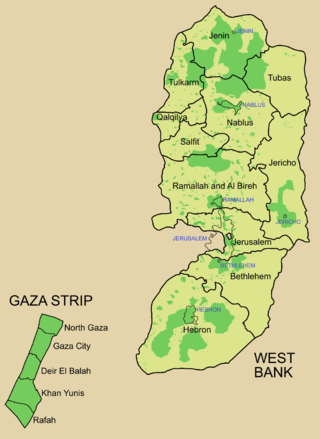
The next legislative elections in Palestine have been repeatedly postponed or cancelled. Most recently it was scheduled for 22 May 2021 according to a decree by President Mahmoud Abbas on 15 January 2021, but was indefinitely postponed on 29 April 2021.

Palestinian fedayeen are militants or guerrillas of a nationalist orientation from among the Palestinian people. Most Palestinians consider the fedayeen to be freedom fighters, while most Israelis consider them to be terrorists.

The Covenant of the Islamic Resistance Movement, referred to as the Hamas Covenant or Hamas Charter, was issued by Hamas on 18 August 1988 and outlines the organization's founding identity, positions, and aims. In 2017, Hamas unveiled a revised charter, without explicitly revoking the 1988 charter.

Shaul Mishal is Professor Emeritus of Political Science at Tel Aviv University. Mishal is Head of the Middle Eastern studies Program at IDC Herzliya, researcher of Arab and Palestinian politics who founded and directed the Center for the Study of Arab Society in Israel. Mishal authored and co-authored several books and numerous articles in subjects related to Arab and Islamic political cultures and Palestinian politics.
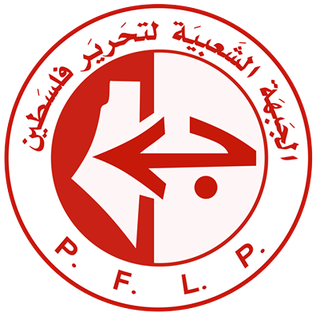
The Popular Front for the Liberation of Palestine is a secular Palestinian Marxist–Leninist and revolutionary socialist organization founded in 1967 by George Habash. It has consistently been the second-largest of the groups forming the Palestine Liberation Organization, the largest being Fatah.

The Battle of Gaza, also known as the Gaza civil war, was a brief civil war between Fatah and Hamas that took place in the Gaza Strip from 10 to 15 June 2007. It was a prominent event in the Fatah–Hamas conflict, centered on the struggle for power after Fatah lost the 2006 Palestinian legislative election. The battle resulted in the dissolution of the unity government and the de facto division of the Palestinian territories into two entities: the West Bank governed by the Palestinian National Authority (PNA), and the Gaza Strip governed by Hamas. Hamas fighters took control of the Gaza Strip, while Fatah officials were either taken as prisoners, executed, or expelled. The Palestinian Centre for Human Rights reported that at least 161 people were killed and more than 700 were wounded during the fighting.
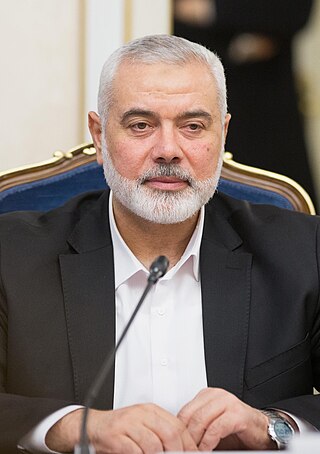
Ismail Haniyeh was a Palestinian politician who served as chairman of the Hamas Political Bureau from May 2017 until his assassination in July 2024. He also served as prime minister of the Palestinian National Authority from March 2006 until June 2014 and Hamas leader in the Gaza Strip from June 2007 until February 2017, where he was succeeded by Yahya Sinwar.
The Agreement on Movement and Access (AMA) was an agreement between Israel and the Palestinian Authority (PA) signed on 15 November 2005 aimed at improving Palestinian freedom of movement and economic activity within the Palestinian territories, and open the Rafah Crossing on the Gaza–Egypt border. AMA was described as: ″an agreement on facilitating the movement of people and goods within the Palestinian Territories and on opening an international crossing on the Gaza-Egypt border that will put the Palestinians in control of the entry and exit of people.″ Part of the agreement was the Agreed Principles for Rafah Crossing.

Palestinian nationalism is the national movement of the Palestinian people that espouses self-determination and sovereignty over the region of Palestine. Originally formed in the early 20th century in opposition to Zionism, Palestinian nationalism later internationalized and attached itself to other ideologies; it has thus rejected the occupation of the Palestinian territories by the government of Israel since the 1967 Six-Day War. Palestinian nationalists often draw upon broader political traditions in their ideology, such as Arab socialism and ethnic nationalism in the context of Muslim religious nationalism. Related beliefs have shaped the government of Palestine and continue to do so.














